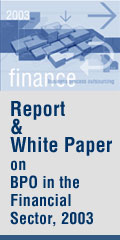|


|
Credit Implications of U.S. Financial Stability Plan and Stimulus Act
February 18, 2009: In response to last week's unveiling of the U.S. Government's Financial Stability Plan (FSP) and signing of the American Recovery and Reinvestment Act (Stimulus Act), Moody's Investors Service has published a detailed analysis of their credit implications. In a Special Comment entitled "Credit Implications of U.S. Financial Stability Plan and Stimulus Act," Moody's presents the following key credit conclusions:
- Banks: The FSP is positive for large banks (with $100 billion in assets or more), but the plan's benefits are less clear for creditors of smaller banks.
- U.S. Government Balance Sheet: The moderate incremental amount of debt that the FSP is likely to lead to and minimal effect on government net worth means that our evaluation of the U.S. government's creditworthiness is unchanged.
- Life Insurers (with the exception of MetLife) are not covered by the FSP as it only applies to federally regulated financial institutions.
- Financial Guarantors are unlikely to receive much relief, hence a ratings-neutral impact, but may benefit indirectly from the FSP's easing of credit conditions.
- Corporates: An increase in lending by banks is essential to prevent an increasingly negative outlook for U.S. corporates. An alleviation of the current market dislocation would prompt corporates to resume their focus on fundamentals and mitigate default risk.
- Securitizations: Reduced unemployment that is likely to result from the Stimulus will have a positive effect on all consumer ABS, RMBS and unguaranteed (private) student loans. The credit quality of covered bonds will improve insofar as the FSP improves the credit strength of banks supporting those programs.
- Technology Firms: The Stimulus's impact on rated technology companies is likely to be quite muted and distant, with no rating implications.
- Municipal Issuers: The Stimulus is unlikely to create longer-term credit benefits for most municipal issuers who face entrenched credit challenges. However, U.S. states will receive nearly $150 billion, which may prevent some downgrades.
- Executive Compensation has been capped for some highly paid employees at firms that have received or will receive TARP assistance. Credit implications are unknown.
(This is press release of Moody's Investors Service)
CLICK FOR SPECIAL SECTION ON GLOBAL FINANCIAL CRISIS
Changing trends in credit asset management
Tough year ahead for Asian banks as recession spreads
Asset quality of Chinese banks under pressure as credit cycle turns
Negative outlook for UAE banking sector, says Moody's
Outlooks on most banking systems in Asia Pacific turns negative
Negative credit outlook for Pakistani banking system
Greater refinancing risk for Asia-Pacific borrowers
Government measures should stabilize global banking markets
Global banking industry to see more restructuring & consolidation
Indian Banking sector challenged by domestic, not global, factors
Subprime Crisis: A Special
CLICK FOR MORE FEATURES & STORIES

|
|
|



